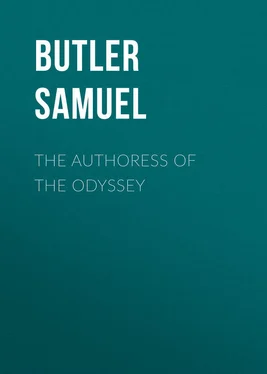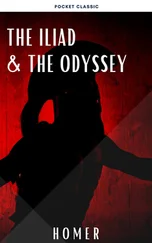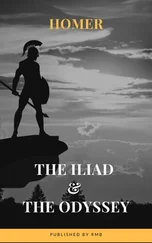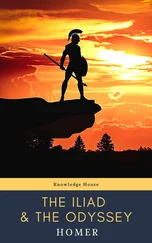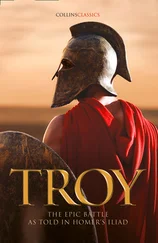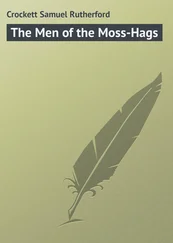Samuel Butler - The Authoress of the Odyssey
Здесь есть возможность читать онлайн «Samuel Butler - The Authoress of the Odyssey» — ознакомительный отрывок электронной книги совершенно бесплатно, а после прочтения отрывка купить полную версию. В некоторых случаях можно слушать аудио, скачать через торрент в формате fb2 и присутствует краткое содержание. Жанр: foreign_antique, foreign_prose, на английском языке. Описание произведения, (предисловие) а так же отзывы посетителей доступны на портале библиотеки ЛибКат.
- Название:The Authoress of the Odyssey
- Автор:
- Жанр:
- Год:неизвестен
- ISBN:нет данных
- Рейтинг книги:5 / 5. Голосов: 1
-
Избранное:Добавить в избранное
- Отзывы:
-
Ваша оценка:
- 100
- 1
- 2
- 3
- 4
- 5
The Authoress of the Odyssey: краткое содержание, описание и аннотация
Предлагаем к чтению аннотацию, описание, краткое содержание или предисловие (зависит от того, что написал сам автор книги «The Authoress of the Odyssey»). Если вы не нашли необходимую информацию о книге — напишите в комментариях, мы постараемся отыскать её.
The Authoress of the Odyssey — читать онлайн ознакомительный отрывок
Ниже представлен текст книги, разбитый по страницам. Система сохранения места последней прочитанной страницы, позволяет с удобством читать онлайн бесплатно книгу «The Authoress of the Odyssey», без необходимости каждый раз заново искать на чём Вы остановились. Поставьте закладку, и сможете в любой момент перейти на страницу, на которой закончили чтение.
Интервал:
Закладка:
How can I expect Homeric scholars to tolerate theories so subversive of all that most of them have been insisting on for so many years? It is a matter of Homeric (for my theory affects Iliadic questions nearly as much as it does the Odyssey ) life and death for them or for myself. If I am right they have invested their reputation for sagacity in a worthless stock. What becomes, for example, of a great part of Professor Jebb's well-known Introduction to Homer – to quote his shorter title – if the Odyssey was written all of it at Trapani, all of it by one hand, and that hand a woman's? Either my own work is rubbish, in which case it should not be hard to prove it so without using discourteous language, or not a little of theirs is not worth the paper on which it is written. They will be more than human, therefore, if they do not handle me somewhat roughly.
As for the Odyssey having been written by a woman, they will tell me that I have not even established a primâ facie case for my opinion. Of course I have not. It was Bentley who did this, when he said that the Iliad was written for men, and the Odyssey for women. 1 1 See Introduction to the Iliad and the Odyssey , by R. C. Jebb, 1888, p. 106.
The history of literature furnishes us with no case in which a man has written a great masterpiece for women rather than men. If an anonymous book strikes so able a critic as having been written for women, a primâ facie case is established for thinking that it was probably written by a woman. I deny, however, that the Odyssey was written for women; it was written for any one who would listen to it. What Bentley meant was that in the Odyssey things were looked at from a woman's point of view rather than a man's, and in uttering this obvious truth, I repeat, he established once for all a strong primâ facie case for thinking that it was written by a woman.
If my opponents can fasten a cavil on to the ninth part of a line of my argument, they will take no heed of, and make no reference to, the eight parts on which they dared not fasten a misrepresentation however gross. They will declare it fatal to my theory that there were no Greek-speaking people at Trapani when the Odyssey was written. Having fished up this assertion from the depths of their ignorance of what Thucydides, let alone Virgil, has told us, – or if they set these writers on one side, out of their still profounder ignorance of what there was or was not at Trapani in the eleventh century before Christ – they will refuse to look at the internal evidence furnished by the Odyssey itself. They will ignore the fact that Thucydides tells us that "Phocians of those from Troy," which as I will show (see Chapter XII.) can only mean Phocæans, settled at Mount Eryx, and ask me how I can place Phocæans on Mount Eryx when Thucydides says it was Phocians who settled there? They will ignore the fact that even though Thucydides had said "Phocians" without qualifying his words by adding "of those from Troy," or "of the Trojan branch," he still places Greek-speaking people within five miles of Trapani.
As for the points of correspondence between both Ithaca and Scheria, and Trapani, they will remind me that Captain Fluelen found resemblances between Monmouth and Macedon, as also Bernardino Caimi did between Jerusalem and Varallo-Sesia; they will say that if mere topographical resemblances are to be considered, the Channel Islands are far more like the Ionian group as described in the Odyssey than those off Trapani are, while Balaclava presents us with the whole Scherian combination so far more plausibly than Trapani as to leave no doubt which site should be preferred. I have not looked at the map of Balaclava to see whether this is so or no, nor yet at other equally promising sites which have been offered me, but am limiting myself to giving examples of criticisms which have been repeatedly passed upon my theory during the last six years, and which I do not doubt will be repeatedly passed upon it in the future.
On the other hand I may comfort myself by reflecting that however much I may deserve stoning there is no one who can stone me with a clear conscience. Those who hold, as most people now do, that the Iliad and Odyssey belong to ages separated from one another by some generations, must be haunted by the reflection that though the diversity of authorship was prominently insisted on by many people more than two thousand years ago, not a single Homeric student from those days to the end of the last century could be brought to acknowledge what we now deem self-evident. Professor Jebb, writing of Bentley, 2 2 Bentley , Macmillan, 1892, p. 148.
says
He had not felt what is now so generally admitted, that the Odyssey bears the marks of a later time than the Iliad .
How came so great a man as Bentley not to see what is so obvious? Truly, as has been said by Mr. Gladstone, if Homer is old, the systematic and comprehensive study of him is still young. 3 3 Homer , Macmillan, 1878, p. 2.
I shall not argue the question whether the Iliad and Odyssey are by the same person, inasmuch as if I convince the reader that the Odyssey was written by a woman and in Sicily, it will go without saying that it was not written by Homer; for there can be no doubt about the sex of the writer of the Iliad . The same canons which will compel us to ascribe the Odyssey to a woman forbid any other conclusion than that the Iliad was written by a man. I shall therefore proceed at once to the question whether the Odyssey was written by a man or by a woman.
It is an old saying that no man can do better for another than he can for himself, I may perhaps therefore best succeed in convincing the reader if I retrace the steps by which I arrived at the conclusions I ask him to adopt.
I was led to take up the Odyssey by having written the libretto and much of the music for a secular oratorio, Ulysses , on which my friend Mr. H. Festing Jones and I had been for some time engaged. Having reached this point it occurred to me that I had better after all see what the Odyssey said, and finding no readable prose translation, was driven to the original, to which I had not given so much as a thought for some five and thirty years.
The Greek being easy, I had little difficulty in understanding what I read, and I had the great advantage of coming to the poem with fresh eyes. Also, I read it all through from end to end, as I have since many times done.
Fascinated, however, as I at once was by its amazing interest and beauty, I had an ever-present sense of a something wrong, of a something that was eluding me, and of a riddle which I could not read. The more I reflected upon the words, so luminous and so transparent, the more I felt a darkness behind them, that I must pierce before I could see the heart of the writer – and this was what I wanted; for art is only interesting in so far as it reveals an artist.
In the hope of getting to understand the poem better I set about translating it into plain prose, with the same benevolent leaning, say, towards Tottenham Court Road, that Messrs. Butcher and Lang have shewn towards Wardour Street. I admit, however, that Wardour Street English has something to say for itself. The "Ancient Mariner," for example, would have lost a good deal if it had been called "The Old Sailor," but on the whole I take it that a tale so absolutely without any taint of affectation as the Odyssey will speed best being unaffectedly told.
When I came to the Phæacian episode I felt sure that here at any rate the writer was drawing from life, and that Nausicaa, Queen Arete, and Alcinous were real people more or less travestied, and on turning to Colonel Mure's work 4 4 Language and Literature of Ancient Greece , Longman, 1850, Vol. I, p. 404.
I saw that he was of the same opinion. Nevertheless I found myself continually aghast at the manner in which men were made to speak and act – especially, for example, during the games in honour of Ulysses described in Book viii. Colonel Mure says (p. 407) that "the women engross the chief part of the small stock of common sense allotted to the community." So they do, but it never occurred to me to ask myself whether men commonly write brilliant books in which the women are made more sensible than the men. Still dominated by the idea that the writer was a man, I conjectured that he might be some bard, perhaps blind, who lived among the servants much as the chaplain in a great house a couple of hundred years ago among ourselves. Such a bard, even though not blind, would only see great people from a distance, and would not mix with them intimately enough to know how they would speak and act among themselves. It never even crossed my mind that it might have been the commentators who were blind, and that they might have thus come to think that the poet must have been blind too.
Интервал:
Закладка:
Похожие книги на «The Authoress of the Odyssey»
Представляем Вашему вниманию похожие книги на «The Authoress of the Odyssey» списком для выбора. Мы отобрали схожую по названию и смыслу литературу в надежде предоставить читателям больше вариантов отыскать новые, интересные, ещё непрочитанные произведения.
Обсуждение, отзывы о книге «The Authoress of the Odyssey» и просто собственные мнения читателей. Оставьте ваши комментарии, напишите, что Вы думаете о произведении, его смысле или главных героях. Укажите что конкретно понравилось, а что нет, и почему Вы так считаете.
